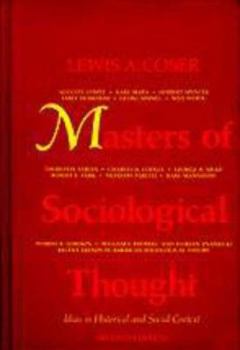Masters of Sociological Thought: Ideas in Historical and Social Context
Select Format
Select Condition 
Book Overview
For today’s readers to understand the history of sociological theories more is required than a knowledge of formal propositions and theoretical structures. In this impressive and enduring text, Coser... This description may be from another edition of this product.
Format:Hardcover
Language:English
ISBN:0155551302
ISBN13:9780155551305
Release Date:January 1977
Publisher:Houghton Mifflin Harcourt P
Length:611 Pages
Weight:2.35 lbs.
Dimensions:1.4" x 6.6" x 9.6"
Customer Reviews
4 ratings
"Was Du Erebt von Deinen Vaetern hast, erwirb es, um es zu besitzen"
Published by Thriftbooks.com User , 15 years ago
This book discusses 14 Masters of Sociological Theory: Auguste Comte, Karl Marx, Herbert Spenser, Emile Durkheim, Georg Simmel, Max Weber, Thorstein Veblen, Charles Horton Cooley, Robert Ezra Park, Vilfredo Pareto, Karl Mannheim, Pitirim A. Sorokin, William I. Thomas, and Florian Znaniecki. It ends with a brief discussion of recent American Sociological Theory. The main thesis of this book is clearly stated in a quote by Goethe preceding the forward, "Was Du Erebt von Deinen Vaetern hast, erwirb es, um es zu besitzen" or "What you have inherited from your fathers, you must earn in order to possess" (Coser, 1977). Coser attempts to portray sociology from its conception to its adulthood through a chronological discovery of its primary participants and their respective theories. There are two aspects of this review, the first focuses on the structure of the book and the second focuses on the content. The structure of book utilizes a separate chapter for individual masters with the exception of Thomas and Znaniecki who share one. Each chapter begins with an overview of the each master's work that explains in summary style the main ideas or contributions that each contributed to the discipline. The second section of each chapter offers a brief biography of each master as well discusses any trials and tribulations he may have experienced growing up. The biography provides background into the master's childhood, including family members, friends, and co-workers. That is followed by an intellectual context section that describes the historical time period of the master and where he fits into the period philosophically. It relates the master's work to others in the period, which demonstrates the importance of peer review [not clear why] that has become so important in today's social sciences. This section additionally discusses the master's acceptance or disapproval of others'] theories and how it relates to his own work. This is accomplished by showing how another theory is used by the master to create a new or enhanced theory. This master used a theory completely disproved as motivation to research a better theory or he may have dissected a theory to use only that which he thought was worthy and reformed a new theory. This section was interesting to read in that it ties together the masters to each other in a chronological manner. This clearly shows how each master used his inheritance of sociological knowledge in such a manner to earn the right to possess it and to eventually bequeath it to the next generation of masters. The final section, social context, addresses the sociological aspects of each master. The social-economic status of each master as well as that of his parents are detailed. The importance that events had on the master, such as revolution, war, discrimination, religious evolutions, etc. are discussed as well. This section explains clearly how such events may have shaped the minds of each master. The author takes some liberty with
Awesome!
Published by Thriftbooks.com User , 20 years ago
This piece includes all the greats within social thought (that truly should be included). I use this as a text for my Social Thought course. It is especially nice that "revisionists" thinking concerning the greats that had the largest impact on the field of sociology have not corrupted the presentation of the material included in this text.Coser also made some various difficult concepts to understand well-orginized and highly understandable - outstanding job!
Great Compendium of Classic Sociological Thought!
Published by Thriftbooks.com User , 22 years ago
Lewis A. Coser does an excellant job pulling together literature from many of the key social theorists including Comte, Marx, Spenscer, Durkheim, Weber, etc. The forward to book best sums up the books goal to provide a "cexposition of classical sociological thought is critical in tone, comprehensive in scope, and conscientious in its attention to detail." The book clearly achieves this goal! A definate highlight is the final chapter which provides overview and analysis of recent trends in American sciological thought.
Great for research
Published by Thriftbooks.com User , 24 years ago
I used this book for a research paper....wonderful source. Well written, and easy to understand.





